Unit 9 Lesson 49 Get Along with Others课件(共28张PPT) 冀教版九年级全一册
文档属性
| 名称 | Unit 9 Lesson 49 Get Along with Others课件(共28张PPT) 冀教版九年级全一册 | 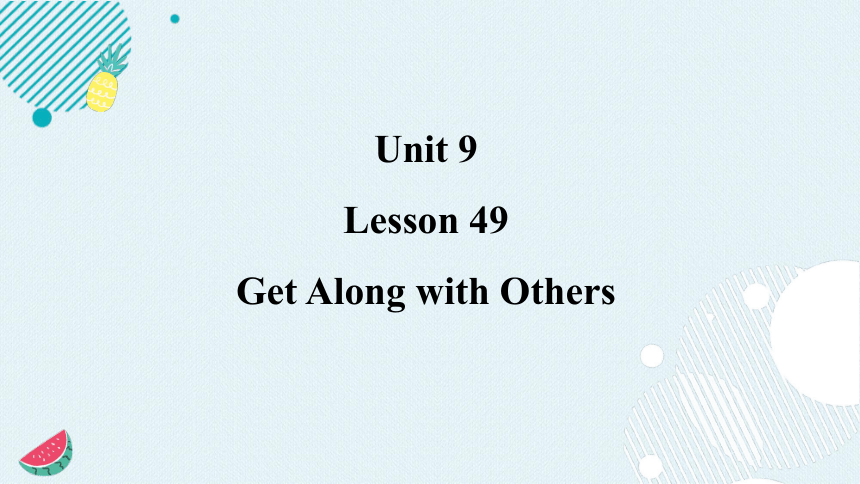 | |
| 格式 | pptx | ||
| 文件大小 | 4.2MB | ||
| 资源类型 | 教案 | ||
| 版本资源 | 冀教版 | ||
| 科目 | 英语 | ||
| 更新时间 | 2024-08-02 21:54:18 | ||
图片预览


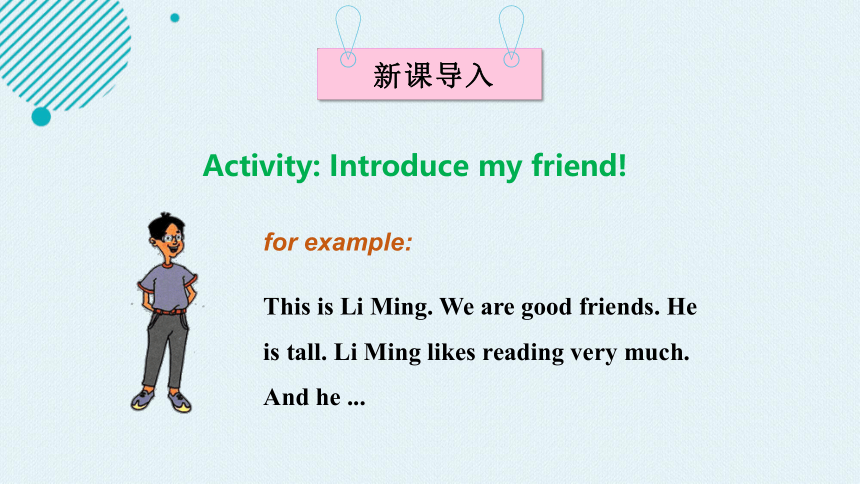
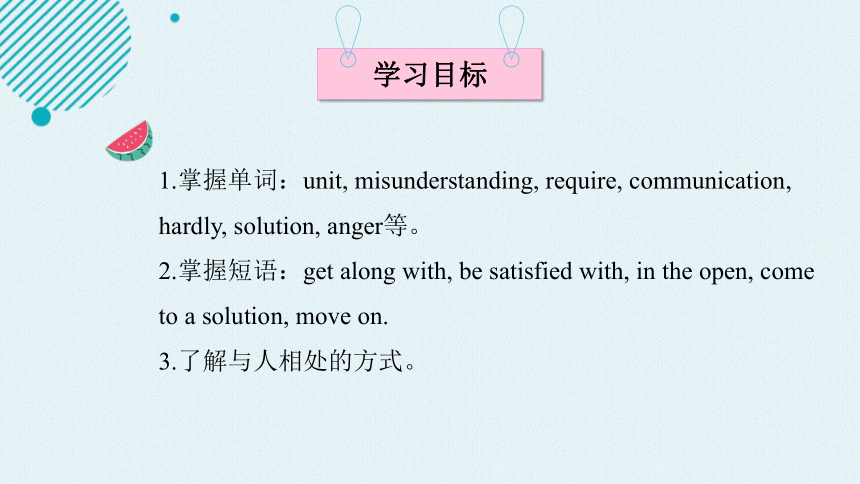
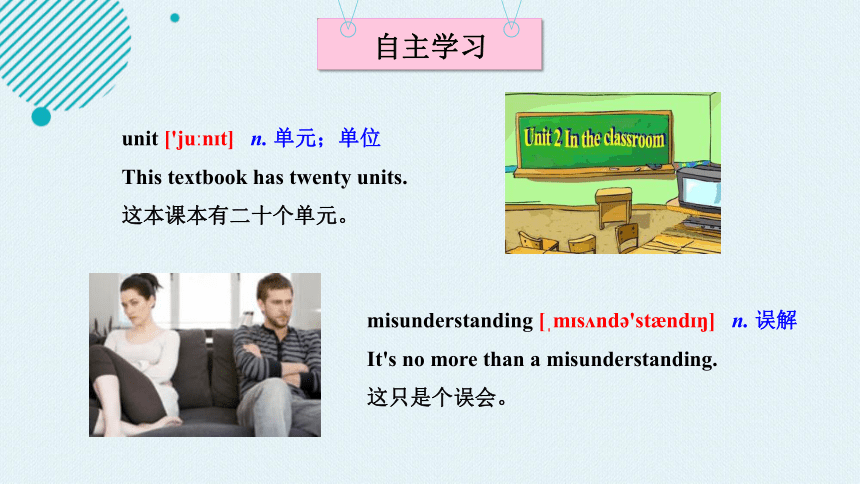
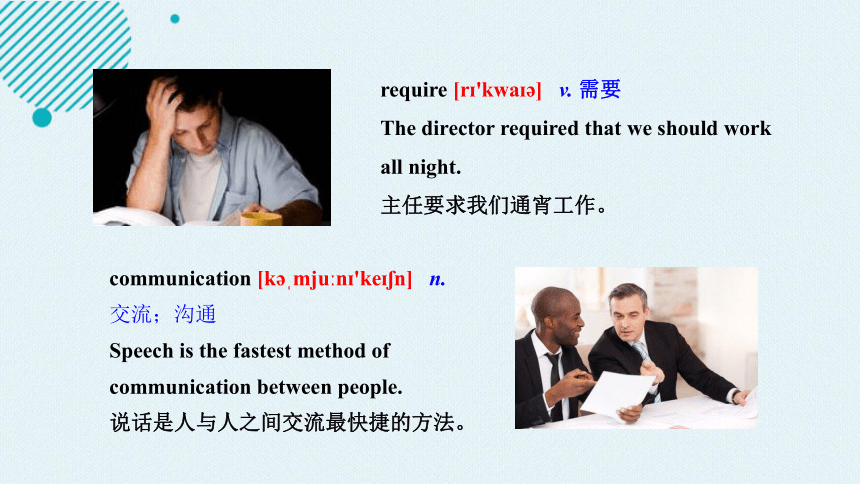
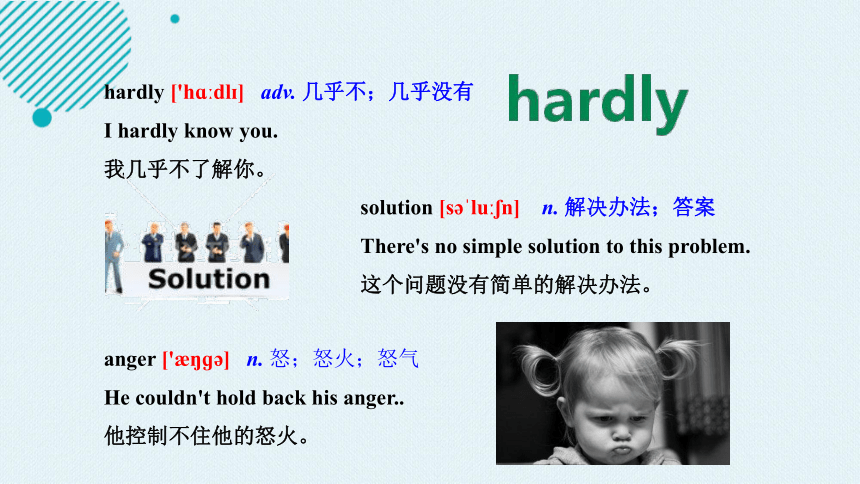
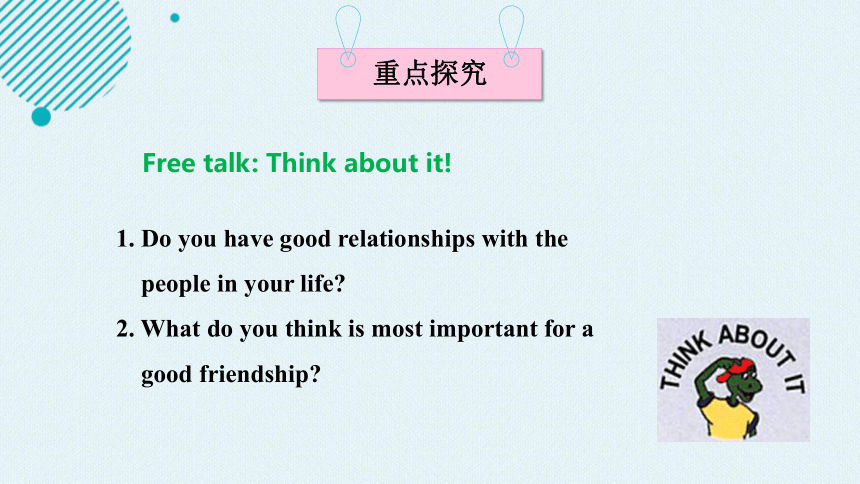
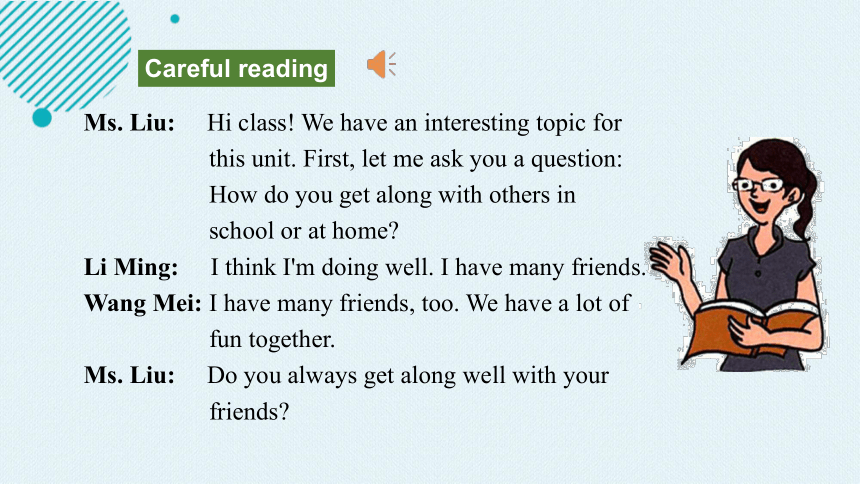
文档简介
(共28张PPT)
Unit 9
Lesson 49
Get Along with Others
1.学习目标
3.重点探究
2.自主学习
学习导航
5.当堂检测
6.课堂总结
4.拓展提升
新课导入
This is Li Ming. We are good friends. He is tall. Li Ming likes reading very much. And he ...
Activity: Introduce my friend!
for example:
学习目标
1.掌握单词:unit, misunderstanding, require, communication, hardly, solution, anger等。
2.掌握短语:get along with, be satisfied with, in the open, come to a solution, move on.
3.了解与人相处的方式。
自主学习
misunderstanding [ m s nd 'st nd ] n. 误解
It's no more than a misunderstanding.
这只是个误会。
unit ['ju n t] n. 单元;单位
This textbook has twenty units.
这本课本有二十个单元。
require [r 'kwa ] v. 需要
The director required that we should work all night.
主任要求我们通宵工作。
communication [k mju n 'ke n] n. 交流;沟通
Speech is the fastest method of communication between people.
说话是人与人之间交流最快捷的方法。
hardly ['hɑ dl ] adv. 几乎不;几乎没有
I hardly know you.
我几乎不了解你。
solution [s lu n] n. 解决办法;答案
There's no simple solution to this problem.
这个问题没有简单的解决办法。
anger [' ɡ ] n. 怒;怒火;怒气
He couldn't hold back his anger..
他控制不住他的怒火。
重点探究
1. Do you have good relationships with the
people in your life
2. What do you think is most important for a
good friendship
Free talk: Think about it!
Ms. Liu: Hi class! We have an interesting topic for
this unit. First, let me ask you a question:
How do you get along with others in
school or at home
Li Ming: I think I'm doing well. I have many friends.
Wang Mei: I have many friends, too. We have a lot of
fun together.
Ms. Liu: Do you always get along well with your
friends
Careful reading
Wang Mei: Well, not always…Sometimes friends
have misunderstandings. Sometimes
a friend really hurts you without
realizing it.
Li Ming: That's true. Friendship requires good
communication.
Ms. Liu: Very good point. If we can't
communicate well, we can hardly
get along with our friends. It's the
same with family relationships.
Yang Hao: I guess that people who know how to communicate well with
others are happier and more satisfied with their lives. They are
more likely to succeed in their jobs.
Ms. Liu: Exactly! That's why communication is very important. It's
always better to get things out in the open — talk about a
problem, come to a solution or move on. Bad feelings like hate
and anger can make you seriously ill. This week we'll talk more
about communication. Hopefully, we'll all learn to get along
better with each other!
Read the lesson and answer the main ideas of three people.
1. Li Ming:
He thinks he is doing well.
2. Wang Mei:
She has many friends. They have a lot of fun together.
3. Yang Hao:
People who know how to communicate well with others
are happier and more satisfied with their lives.
After reading
Read the lesson and match the people with their statements.
Let's Do It !
1
Friendship requires good communication.
People who know how to communicate well with others are more likely to succeed in their jobs.
It's always better to get things out in the open.
Sometimes friends have misunderstandings.
Let's Do It !
Rewrite the sentences below with the correct forms of the phrases from the lesson.
2
1. It took them more than an hour to solve the problem.
→It took them more than an hour to ______________________.
2. We had a wonderful time in the park.
→We had _____________ in the park.
come to a solution
a lot of fun
Change the following adjectives into adverbs and use them to complete the sentences.
3
Let's Do It !
easy __________ hopeful _________ exact _________
real __________ serious _________
easily
hopefully
exactly
really
seriously
1. Using the search engines, you can ________find books in the library.
2. Here is a book on grammar. ___________, it will help you with your study.
easily
Hopefully
Let's Do It !
easy __________ hopeful _________ exact _________
real __________ serious _________
easily
hopefully
exactly
really
seriously
3. The old lady walked _______ slowly. It took her a long time to get there.
4. I'm sorry to hear that. Was she _____________ hurt
5. Jim must have copied Paul's work because they made __________ the
same mistakes.
really
seriously
exactly
Work in groups. Share your ideas about communication.
You can use “I think…”, “I guess…”, “That's for sure!”, “That's true!” or “Good point!”.
4
Let's Do It !
Group work
Work in groups
Let’s see which group does the best.
拓展提升
get along (with) sb. 意为“(与某人)和睦相处”。
与 get on with sb. 同义;
get along/on badly with sb. 意为“与某人相处不融洽”。
拓展: get on/along with 意为“进展”
e.g. How are you getting on/along with your English studies
e.g. Do you always get along well with your classmates
2. Friendship requires good communication.
require 作及物动词,意为“需要;要求”
后面常接名词、代词、doing、不定式的复合结构或that从句
(从句谓语用“(should) + 动词原形”)。
拓展:(1)require doing sth.意为“需要(被)……”
=require to be done...
e.g. The bike requires painting.
=The house requires to be painted.
(2)require 可用于被动语态,但不用于进行时态。
e.g. We are required to take part in the meeting.
3. It is / was the same with …(= So it is / was with…)
是表达“也”的一个句型,无论前提是肯定或否定意思都可使用。
e.g. — I didn't talk much about communication last night.
— It was the same with me. / So it was with me. / I
didn't, either. / Neither did I.
4. They are more likely to succeed in their jobs.
likely 形容词, 表示“可能的; 有倾向的”,
既可用人, 也可用物作主语。more likely是likely的比较级。
e.g. She isn't likely to come now. It's too late.
拓展: be likely to do sth.“可能做某事”
e.g. It’s likely to rain.
5. It's always better to get things out in the open talk about
a problem, come to a solution or move on.
get … out “使……出来”
e.g. Please get the pig out.
come to a solution 得出解决方案;得出解答
拓展: the solution(s) to...“……的解决办法”
e.g. Do you have a better solution to this probem
6. in the open “公开地”
e.g. He doesn't dare to act in the open.
拓展:in the open 还有“在露天(户外、野外)”的意思。
7. come to “得到 (结果)”
e.g. They came to a fight.
8. be satisfied with=be pleased with 对……满意
9. move on “更换话题;往前走;前进”
e.g. We have talked much about this trouble. Let's
move on.
10. hopefully 副词,“(抱)有希望地”在句中作状语,能这样用的通常是-ly结尾的副词。
e.g. Hopefully, I think he passed the exam.
拓展: hopeful 形容词,抱有希望的;
hopeless 形容词,无望的;
当堂检测
一、根据首字母或汉语提示写单词。
1. Last week we learned ________ (单元) Eight.
2. Doing anything r__________ patience.
3. After you argue with your parents you must _____________ (交流)with them and explain why you did that.
4. Can you come up with a better __________ (解决方法)
5. She was so angry that she could h_______ say a word.
Unit
equires
communicate
solution
ardly
二、完成句子。
1.这是多么有趣的一个话题啊!
_______ _______ __________ topic this is!
2.他和他的同学们相处得很融洽。
He ______ _______ ______ _______ his classmates.
3.英语老师对我的回答很满意。
My English teacher is very _______ _______ my answer.
4.我爸爸总是谈论那个问题。
My father always ________ _______ that problem.
5.太晚了,她现在不可能来了。
It’s too late. She isn’t _______ ______ _______ now.
What an interesting
gets along well with
satisfied with
talks about
likely to come
课堂总结
Unit 9
Lesson 49
1.掌握单词:unit, misunderstanding, require, communication, hardly, solution, anger.
2.掌握短语:get along with, be satisfied with, in the open, come to a solution, move on.
3.了解与人相处的方式。
Unit 9
Lesson 49
Get Along with Others
1.学习目标
3.重点探究
2.自主学习
学习导航
5.当堂检测
6.课堂总结
4.拓展提升
新课导入
This is Li Ming. We are good friends. He is tall. Li Ming likes reading very much. And he ...
Activity: Introduce my friend!
for example:
学习目标
1.掌握单词:unit, misunderstanding, require, communication, hardly, solution, anger等。
2.掌握短语:get along with, be satisfied with, in the open, come to a solution, move on.
3.了解与人相处的方式。
自主学习
misunderstanding [ m s nd 'st nd ] n. 误解
It's no more than a misunderstanding.
这只是个误会。
unit ['ju n t] n. 单元;单位
This textbook has twenty units.
这本课本有二十个单元。
require [r 'kwa ] v. 需要
The director required that we should work all night.
主任要求我们通宵工作。
communication [k mju n 'ke n] n. 交流;沟通
Speech is the fastest method of communication between people.
说话是人与人之间交流最快捷的方法。
hardly ['hɑ dl ] adv. 几乎不;几乎没有
I hardly know you.
我几乎不了解你。
solution [s lu n] n. 解决办法;答案
There's no simple solution to this problem.
这个问题没有简单的解决办法。
anger [' ɡ ] n. 怒;怒火;怒气
He couldn't hold back his anger..
他控制不住他的怒火。
重点探究
1. Do you have good relationships with the
people in your life
2. What do you think is most important for a
good friendship
Free talk: Think about it!
Ms. Liu: Hi class! We have an interesting topic for
this unit. First, let me ask you a question:
How do you get along with others in
school or at home
Li Ming: I think I'm doing well. I have many friends.
Wang Mei: I have many friends, too. We have a lot of
fun together.
Ms. Liu: Do you always get along well with your
friends
Careful reading
Wang Mei: Well, not always…Sometimes friends
have misunderstandings. Sometimes
a friend really hurts you without
realizing it.
Li Ming: That's true. Friendship requires good
communication.
Ms. Liu: Very good point. If we can't
communicate well, we can hardly
get along with our friends. It's the
same with family relationships.
Yang Hao: I guess that people who know how to communicate well with
others are happier and more satisfied with their lives. They are
more likely to succeed in their jobs.
Ms. Liu: Exactly! That's why communication is very important. It's
always better to get things out in the open — talk about a
problem, come to a solution or move on. Bad feelings like hate
and anger can make you seriously ill. This week we'll talk more
about communication. Hopefully, we'll all learn to get along
better with each other!
Read the lesson and answer the main ideas of three people.
1. Li Ming:
He thinks he is doing well.
2. Wang Mei:
She has many friends. They have a lot of fun together.
3. Yang Hao:
People who know how to communicate well with others
are happier and more satisfied with their lives.
After reading
Read the lesson and match the people with their statements.
Let's Do It !
1
Friendship requires good communication.
People who know how to communicate well with others are more likely to succeed in their jobs.
It's always better to get things out in the open.
Sometimes friends have misunderstandings.
Let's Do It !
Rewrite the sentences below with the correct forms of the phrases from the lesson.
2
1. It took them more than an hour to solve the problem.
→It took them more than an hour to ______________________.
2. We had a wonderful time in the park.
→We had _____________ in the park.
come to a solution
a lot of fun
Change the following adjectives into adverbs and use them to complete the sentences.
3
Let's Do It !
easy __________ hopeful _________ exact _________
real __________ serious _________
easily
hopefully
exactly
really
seriously
1. Using the search engines, you can ________find books in the library.
2. Here is a book on grammar. ___________, it will help you with your study.
easily
Hopefully
Let's Do It !
easy __________ hopeful _________ exact _________
real __________ serious _________
easily
hopefully
exactly
really
seriously
3. The old lady walked _______ slowly. It took her a long time to get there.
4. I'm sorry to hear that. Was she _____________ hurt
5. Jim must have copied Paul's work because they made __________ the
same mistakes.
really
seriously
exactly
Work in groups. Share your ideas about communication.
You can use “I think…”, “I guess…”, “That's for sure!”, “That's true!” or “Good point!”.
4
Let's Do It !
Group work
Work in groups
Let’s see which group does the best.
拓展提升
get along (with) sb. 意为“(与某人)和睦相处”。
与 get on with sb. 同义;
get along/on badly with sb. 意为“与某人相处不融洽”。
拓展: get on/along with 意为“进展”
e.g. How are you getting on/along with your English studies
e.g. Do you always get along well with your classmates
2. Friendship requires good communication.
require 作及物动词,意为“需要;要求”
后面常接名词、代词、doing、不定式的复合结构或that从句
(从句谓语用“(should) + 动词原形”)。
拓展:(1)require doing sth.意为“需要(被)……”
=require to be done...
e.g. The bike requires painting.
=The house requires to be painted.
(2)require 可用于被动语态,但不用于进行时态。
e.g. We are required to take part in the meeting.
3. It is / was the same with …(= So it is / was with…)
是表达“也”的一个句型,无论前提是肯定或否定意思都可使用。
e.g. — I didn't talk much about communication last night.
— It was the same with me. / So it was with me. / I
didn't, either. / Neither did I.
4. They are more likely to succeed in their jobs.
likely 形容词, 表示“可能的; 有倾向的”,
既可用人, 也可用物作主语。more likely是likely的比较级。
e.g. She isn't likely to come now. It's too late.
拓展: be likely to do sth.“可能做某事”
e.g. It’s likely to rain.
5. It's always better to get things out in the open talk about
a problem, come to a solution or move on.
get … out “使……出来”
e.g. Please get the pig out.
come to a solution 得出解决方案;得出解答
拓展: the solution(s) to...“……的解决办法”
e.g. Do you have a better solution to this probem
6. in the open “公开地”
e.g. He doesn't dare to act in the open.
拓展:in the open 还有“在露天(户外、野外)”的意思。
7. come to “得到 (结果)”
e.g. They came to a fight.
8. be satisfied with=be pleased with 对……满意
9. move on “更换话题;往前走;前进”
e.g. We have talked much about this trouble. Let's
move on.
10. hopefully 副词,“(抱)有希望地”在句中作状语,能这样用的通常是-ly结尾的副词。
e.g. Hopefully, I think he passed the exam.
拓展: hopeful 形容词,抱有希望的;
hopeless 形容词,无望的;
当堂检测
一、根据首字母或汉语提示写单词。
1. Last week we learned ________ (单元) Eight.
2. Doing anything r__________ patience.
3. After you argue with your parents you must _____________ (交流)with them and explain why you did that.
4. Can you come up with a better __________ (解决方法)
5. She was so angry that she could h_______ say a word.
Unit
equires
communicate
solution
ardly
二、完成句子。
1.这是多么有趣的一个话题啊!
_______ _______ __________ topic this is!
2.他和他的同学们相处得很融洽。
He ______ _______ ______ _______ his classmates.
3.英语老师对我的回答很满意。
My English teacher is very _______ _______ my answer.
4.我爸爸总是谈论那个问题。
My father always ________ _______ that problem.
5.太晚了,她现在不可能来了。
It’s too late. She isn’t _______ ______ _______ now.
What an interesting
gets along well with
satisfied with
talks about
likely to come
课堂总结
Unit 9
Lesson 49
1.掌握单词:unit, misunderstanding, require, communication, hardly, solution, anger.
2.掌握短语:get along with, be satisfied with, in the open, come to a solution, move on.
3.了解与人相处的方式。
同课章节目录
- Unit 7 Work for Peace
- Lesson 37 Don't Fight!
- Lesson 38 Making School a Better Place
- Lesson 39 The Dove and the Olive Branch
- Lesson 40 The UN—Power of Words
- Lesson 41 Jenny's Good Advice
- Lesson 42 Peace at Last
- Unit Review
- Unit 8 Culture Shapes Us
- Lesson 43 A Visit to Chinatown
- Lesson 44 Popular Sayings
- Lesson 45 Different Manners
- Lesson 46 Home to Many Cultures
- Lesson 47 Good Manners
- Lesson 48 Supper with the Bradshaws
- Unit Review
- Unit 9 Communication
- Lesson 49 Get Along with Others
- Lesson 50 Tips for Good Communication
- Lesson 51 What Could Be Wrong?
- Lesson 52 The Power of a Smile
- Lesson 53 Working in Groups
- Lesson 54 How Embarrassing!
- Unit Review
- Unit 10 Get Ready for the Future
- Lesson 55 Look into the Future
- Lesson 56 Manage Your Time
- Lesson 57 Best Wishes
- Lesson 58 Ms.Liu's Speech
- Lesson 59 Keep Your Choices Open
- Lesson 60 Get a Good Education
- Unit Review
